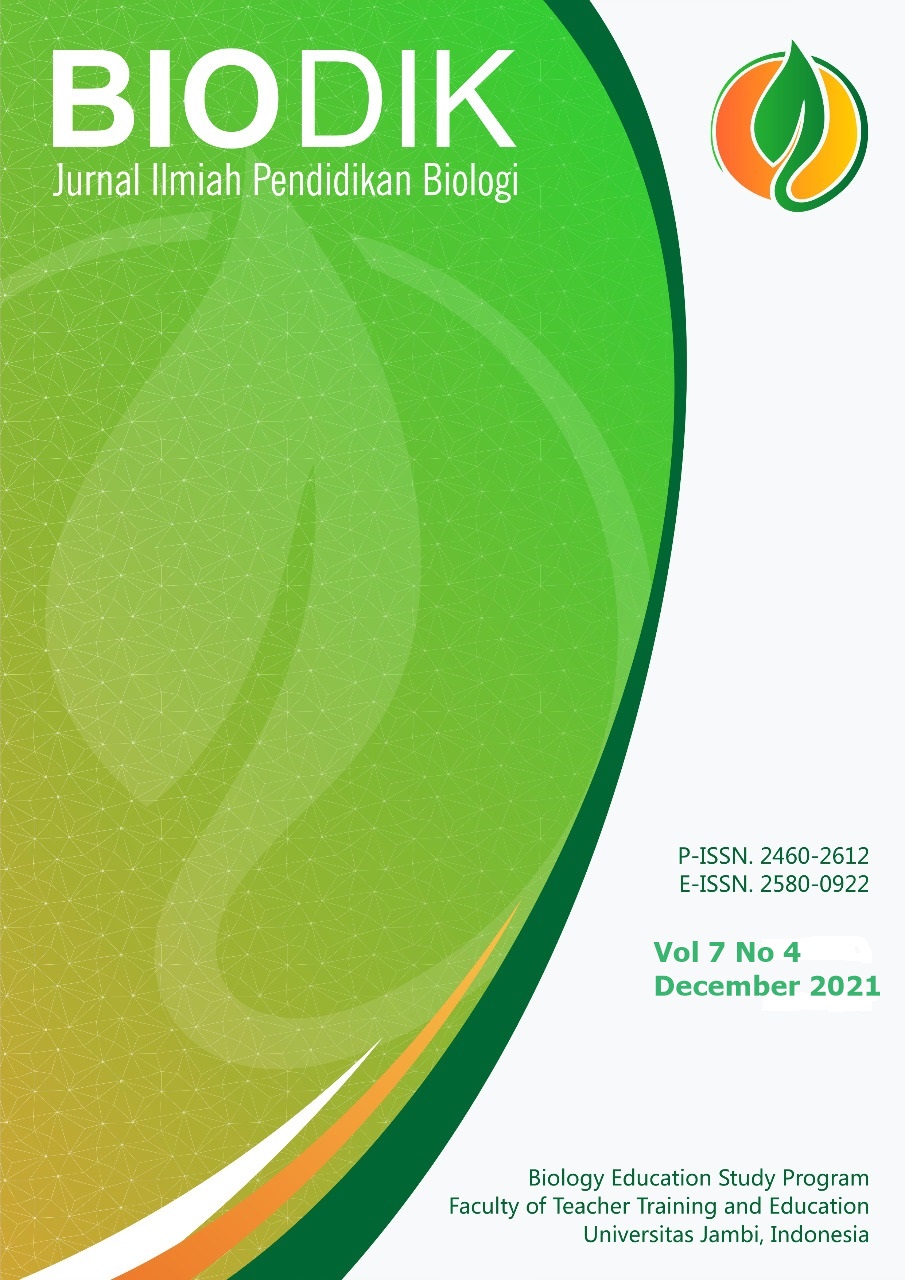Pengembangan LKPD Berbasis Inkuiri Terbimbing Pada Materi Pokok Bahasan Invertebrata Untuk Siswa Kelas X SMA
(Development of Guided Inquiry-Based LKPD on Invertebrate Main Materials for Class X High School Students)
DOI:
https://doi.org/10.22437/bio.v7i4.13572Abstract
This study aims to obtain the final product in the form of LKPD based on Guided Inquiry for Invertebrates. The development model used in this research is the Plomp development model which consists of three stages of development. The LKPD that has been produced is then validated by design experts and material experts to determine the suitability of the products developed. The LKPD that has been revised and declared feasible by the expert (validator) is then tested in class X high school students and biology teachers. Based on the assessment of design experts, it was found that the LKPD design was very feasible, with a score of 56 or 87.5%. Meanwhile, from the results of the material expert assessment, it was found that the material on the LKPD was very feasible, with a score of 104 or 81.25%. The results of individual trials and small group trials showed that the LKPD had a very practical level of practicality, with a practicality score of 38.33 and 39.5, respectively. Likewise, the results of the practicality assessment by the teacher showed that the LKPD has a very practical level of practicality, with a practicality score of 36. Thus, it can be concluded that the LKPD based on Guided Inquiry on Invertebrate Subject Matter is very feasible and practical to be used in learning activities students in class X of Senior High School.
Abstrak. Penelitian ini bertujuan mendapatkan produk akhir berupa LKPD berbasis Inkuiri Terbimbing Materi Pokok Bahasan Invertebrata. Model pengembangan yang digunakan dalam penelitian ini adalah model pengembangan Plomp yang terdiri dari tiga tahapan pengembangan. LKPD yang telah dihasilkan kemudian divalidasi oleh ahli desain dan ahli materi untuk mengetahui kesesuaian dari produk yang dikembangkan. LKPD yang telah direvisi dan dinyatakan layak oleh ahli (validator) kemudian diujicobakan kepada siswa kelas X SMA dan guru mata pelajaran biologi. Berdasarkan penilaian ahli desain, didapatkan bahwa desain LKPD berada sudah sangat layak, dengan perolehan skor sebesar 56 atau 87,5%. Sementara dari hasil penilaian ahli materi, didapatkan bahwa materi pada LKPD sudah sangat layak, dengan perolehan skor sebesar104 atau 81,25%. Hasil ujicoba perorangan dan ujicoba kelompok kecil didapatkan bahwa LKPD memiliki tingkat kepraktisan sangat praktis, dengan perolehan skor praktikalitas masing-masing sebesar 38,33 dan 39,5. Begitupula hasil penilaian praktikalitas oleh guru didapatkan bahwa LKPD memiliki tingkat kepraktisan sangat praktis, dengan perolehan skor praktikalitas sebesar 36. Dengan demikian dapat disimpulkan bahwa LKPD berbasis Inkuiri Terbimbing Materi Pokok Bahasan Invertebrata sudah sangat layak dan praktis untuk digunakan dalam kegiatan pembelajaran pada siswa kelas X SMA.
Â
Downloads
References
Annafi, N., Ashadi, dan Sri Mulyani. (2015). Pengembangan Lembar Kegiatan Peserta Didik Berbasis Inkuiri Terbimbing pada Materi Termokimia Kelas XI SMA/MA. Jurnal Inkuiri, Vol. 4 (3):21-28.
Arends, R.I. (2012). Learning to Teach. Ninth Edition. New York: Mc.Graw-Hill.
Bilgin, I. (2009). The Effect of Guided Inquiry Instruction Incorporating a Cooperative Learning Approach on University students’ Achievement of Acid and Based Concepts and Attitude Toward Guided Inquiry Instruction. Scientific Research and Essay. Volume 4. No. 10. Pp 1038-1046. Turki.
Firdaus, M. dan Wilujeng, I. (2018). Pengembangan LKPD inkuiri terbimbing untuk meningkatkan keterampilan berpikir kritis dan hasil belajar peserta didik. Jurnal Inovasi Pendidikan IPA, Vol. 4 (1): 26-40.
Miles, M.B., A.M. Huberman, dan J. Saldana. (2014). Qualitative Data Analysis, A Methods Sourcebook. Terj. Tjetjep Rohindi Rohidi. Jakarta: UI-Press.
Nurhafizah, Anandita Eka Setiadi, dan Adi Pasah Kahar. (2017). Pengembangan Lembar Kegiatan Siswa (Lks) Berbasis Inkuiri Pada Materi Sel Kelas XI MA Raudhatul Firdaus Kubu Raya. Jurnal Bio education,Vol. 4 (1).
Plomp, T. (2013). An Introduction to Educational Design Research. Enschede: Netherlands Institute for Curricullum Development.
Pratiwi, D. M., Saputro, S. & Nugroho, A. (2015). Pengembangan LKS Praktikum Berbasis Inkuiri Terbimbing pada Pokok Bahasan Larutan Penyangga Kelas XI IPA SMA. Jurnal Pendidikan Kimia (JPK), Vol. 4 (2): 32-37.
Putri, B.K. (2013). Pengembangan LKS IPA Terpadu Berbasis Inkuiri Tema
Darah Di SMPN 2 Tengaran. Jurnal Pendidikan Ipa Indonesia, Vol 2 (2) 102-106.
Rohaeti, E., Endang Widjajanti LFX, dan Regina Tutik Padmaningrum. (2009). Pengembangan Lembar Kerja Siswa (LKS) Mata Pelajaran Sains Kimia untuk SMP. Inovasi Pendidikan, Vol. 10 (1):1-11
Sukardi. (2008). Metodologi Penelitian Pendidikan, Kompetensi dan Praktiknya. Jakarta : PT. Bumi Aksara
Downloads
Published
How to Cite
Issue
Section
License
Copyright (c) 2022 Ahmad Syarief Ramadhani, Revis Asra, Evita Anggereini

This work is licensed under a Creative Commons Attribution-NonCommercial-ShareAlike 4.0 International License.
Copyright Notice
Authors who publish with Biodik : Jurnal Ilmiah Pendidikan Biologi agree to the following terms:
- For all articles published in Biodik : Jurnal Ilmiah Pendidikan Biologi, copyright is retained by the authors and grant the journal right of first publication with the work simultaneously licensed under a Creative Commons Attribution-ShareAlike 4.0 International Licensethat allows others to share the work with an acknowledgment of the work's authorship and initial publication in this journal.
- Authors are able to enter into separate, additional contractual arrangements for the non-exclusive distribution of the journal's published version of the work (e.g., post it to an institutional repository or publish it in a book), with an acknowledgment of its initial publication in this journal.
- Authors are permitted and encouraged to post their work online (e.g., in institutional repositories or on their website) prior to and during the submission process, as it can lead to productive exchanges, as well as earlier and greater citation of published work (See The Effect of Open Access).
















